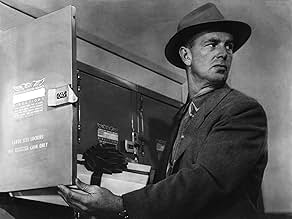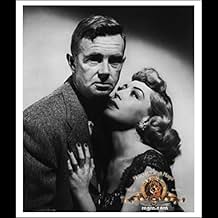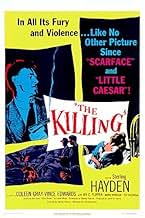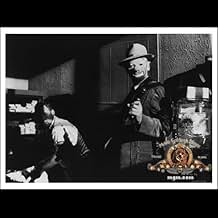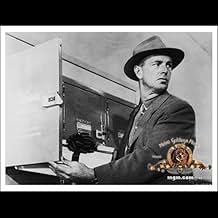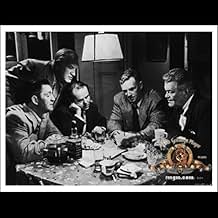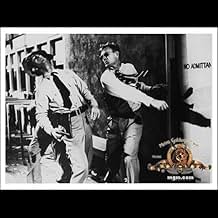Un truand monte une équipe de cinq hommes dans le but de planifier et d'exécuter un audacieux braquage pendant une course de chevaux.Un truand monte une équipe de cinq hommes dans le but de planifier et d'exécuter un audacieux braquage pendant une course de chevaux.Un truand monte une équipe de cinq hommes dans le but de planifier et d'exécuter un audacieux braquage pendant une course de chevaux.
- Director
- Writers
- Stars
- Nominé pour le prix 1 BAFTA Award
- 1 nomination au total
Ted de Corsia
- Patrolman Randy Kennan
- (as Ted DeCorsia)
Elisha Cook Jr.
- George Peatty
- (as Elisha Cook)
Joe Turkel
- Tiny
- (as Joseph Turkel)
Avis en vedette
Stanley Kubrick's coming-out party from the mid '50s is a startlingly accurate prediction of film's future. By way of a non-linear narration and a few remarkably fresh transitions, Kubrick adds considerable weight and magnitude to a tangled heist tale and its focus on the crooks behind a slick, daring stickup of the local racetrack. Confused by the film's radical new approach to storytelling, test audiences hated the first cut, leading to studio meddling and an almost-complete disintegration of its marketing budget. Kubrick fought back, though, and with the obvious exception of a horribly heavy-handed deadpan narration, the finished product seems virtually untouched. Concerned mostly with the planning and hand-wringing before the big theft, The Killing tensely builds anticipation throughout before finally boiling over in a machine gun-paced robbery scene, terse payoff and all-too-brief elaboration on the major players' ultimate fates. Acceptably acted at best, the real stars of this picture are the complex plot and the harvest of fresh ideas going on behind the lens. A clear inspiration for Tarantino's big hits of the '90s, it's a daring and stylish major market debut for the famed director that hints at the lengths his development would ultimately take the medium.
The story of a meticulously-planned race track hold-up is a stunner in every minute you watch it, and the film's progressive use of a partly documentary style has often been acclaimed as uniquely supporting the dramatic goings-on. It definitely put a modern touch to the somewhat out-of-fashion film noir in 1956, but still greatly relied on its basic rules.
A fine new note was the neat distinction between the gang's members' motives, ranging from repaying underworld debts (De Corsia) and hope of offering a better life for his ill wife (Sawyer) to the vain ambition of pleasing his vamp wife by doing something special (Cook).
Despite the film's qualities, Kubrick's treatment of the women's rôles seems more than old-fashioned today. Women here are either the homely and sweet type (Coleen Gray) or the Bette-Davis-eyed and cherchez-la-femme type (Marie Windsor). Both are accordingly taller or smaller than their respective partners by a head.
I should like to mention one of my favourite pans: that's when the bald philosopher-catcher walks up to Joe Sawyer's bar. Lucien Ballard's camera follows him all across the crowded tote hall, a take which must have been very difficult to organize and shoot. Later, the scene is repeated with Sterling Hayden.
This motion picture is also a monument for the great histrionic art of Elisha Cook, Jr., in a stand-out performance as the born loser. (German dubbing gives him the apt voice of Stan Laurel's speaker Walter Bluhm.) This little man never just did his job in unnumerable supporting rôles but has rendered effective homage to the tragic figure on the silver screen more than any other (non-comical) character actor I can think of. Regardless of his versatility in lots of different films, his impersonations of a likeable man who is doomed to fail make him unforgettable: take his lethal parts in "Phantom Lady" (1944), "Shane" (1953) or the likes, the audience's sympathy was always with this fine actor.
A fine new note was the neat distinction between the gang's members' motives, ranging from repaying underworld debts (De Corsia) and hope of offering a better life for his ill wife (Sawyer) to the vain ambition of pleasing his vamp wife by doing something special (Cook).
Despite the film's qualities, Kubrick's treatment of the women's rôles seems more than old-fashioned today. Women here are either the homely and sweet type (Coleen Gray) or the Bette-Davis-eyed and cherchez-la-femme type (Marie Windsor). Both are accordingly taller or smaller than their respective partners by a head.
I should like to mention one of my favourite pans: that's when the bald philosopher-catcher walks up to Joe Sawyer's bar. Lucien Ballard's camera follows him all across the crowded tote hall, a take which must have been very difficult to organize and shoot. Later, the scene is repeated with Sterling Hayden.
This motion picture is also a monument for the great histrionic art of Elisha Cook, Jr., in a stand-out performance as the born loser. (German dubbing gives him the apt voice of Stan Laurel's speaker Walter Bluhm.) This little man never just did his job in unnumerable supporting rôles but has rendered effective homage to the tragic figure on the silver screen more than any other (non-comical) character actor I can think of. Regardless of his versatility in lots of different films, his impersonations of a likeable man who is doomed to fail make him unforgettable: take his lethal parts in "Phantom Lady" (1944), "Shane" (1953) or the likes, the audience's sympathy was always with this fine actor.
There's little to fault in Stanley Kubrick's classic robbery tale. The acting is first-rate with Marie Windsor, as Mrs. Peaty, a sarcastic stand-out. The story just pops off the screen - and at less than 90 minutes, there's literally no filler. I love the winding time line ("earlier that day" etc.), which has been liberally utilized by Quentin Tarantino (Jackie Brown, Pulp Fiction, Reservoir Dogs). This film was made right before Kubrick's WWI marvel, Paths of Glory, and his genius is apparent in both. No wasted words or actions. Love that last line!
Director Stanley Kubrick is best known for "2001: A Space Odyssey." "A Clockwork Orrange" or "The Shining" but I always found this to be my favorite of his films. This is film noir at some of its best: a tight no-nonsense story with tragic consequences, some of the best film noir actors in the business and great cinematography, which looks even better on DVD.
Sterling Hayden is the gang leader in this heist film and the big man was up to the task as he usually was in these kind of crime films. He wasn't as rough a character as he was in "Asphalt Jungle," but his role reminded me of that film.
What made this movie so appealing to me were four very interesting character actors: Elisha Cook Jr., Marie Windsor, Kola Kwariani and Ted de Corsia. Few people had those loser-type film noir characters down pat as well as the tough-talking Windsor and the meek and wimpy Cook. They played a husband-and-wife team here: that's film noir heaven!
Kwariani plays a burley chess-playing wrestler who fights six cops at one time and Carey is a long-distance racist rifleman who talks through clenched-teeth and shoots a racehorse! As I said, some very interesting characters here.
And, oh yeah.....for you over-55 readers, there's Vince Edwards, alias Dr. Ben Casey of TV fame, as a Windsor's young adulterer boyfriend trying to horn in on the money from the robbery.
This film is full of surprises and always fun to watch.
Sterling Hayden is the gang leader in this heist film and the big man was up to the task as he usually was in these kind of crime films. He wasn't as rough a character as he was in "Asphalt Jungle," but his role reminded me of that film.
What made this movie so appealing to me were four very interesting character actors: Elisha Cook Jr., Marie Windsor, Kola Kwariani and Ted de Corsia. Few people had those loser-type film noir characters down pat as well as the tough-talking Windsor and the meek and wimpy Cook. They played a husband-and-wife team here: that's film noir heaven!
Kwariani plays a burley chess-playing wrestler who fights six cops at one time and Carey is a long-distance racist rifleman who talks through clenched-teeth and shoots a racehorse! As I said, some very interesting characters here.
And, oh yeah.....for you over-55 readers, there's Vince Edwards, alias Dr. Ben Casey of TV fame, as a Windsor's young adulterer boyfriend trying to horn in on the money from the robbery.
This film is full of surprises and always fun to watch.
Film noir in all its splendor, with a very dynamic rhythm, far from '2001, a space odyssey': an audacious burglary seems perfectly orchestrated and prepared with a surgical precision, until a minor glitch transforms a 'Symphonie fantastique' in a 'Descente d'Orphée aux enfers'.
Le saviez-vous
- AnecdotesInitial test screenings were poor, citing the non-linear structure as the main problem. Stanley Kubrick was forced to go back and edit the film in a linear fashion, making the film even more confusing. In the end, it was released in its original form, and is often cited as being a huge influence on other non-linear films like Les enragés (1992) and Fiction pulpeuse (1994).
- GaffesDuring the robbery, it's clear that a significant amount of the money is in neatly banded bundles of crisp brand-new bills, yet when it's transferred from the duffel bag to the suitcase, all the bills are loose, unstacked, and appear well-used.
- Citations
Johnny Clay: You'd be killing a horse - that's not first degree murder, in fact it's not murder at all, in fact I don't know what it is.
- ConnexionsEdited into Hai-Kubrick (1999)
Meilleurs choix
Connectez-vous pour évaluer et surveiller les recommandations personnalisées
Détails
- Date de sortie
- Pays d’origine
- Langue
- Aussi connu sous le nom de
- Casta de malditos
- Lieux de tournage
- société de production
- Consultez plus de crédits d'entreprise sur IMDbPro
Box-office
- Budget
- 320 000 $ US (estimation)
- Brut – à l'échelle mondiale
- 380 $ US
- Durée1 heure 24 minutes
- Couleur
Contribuer à cette page
Suggérer une modification ou ajouter du contenu manquant


